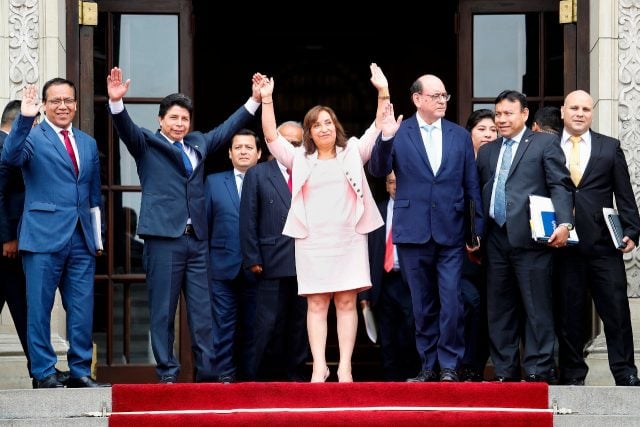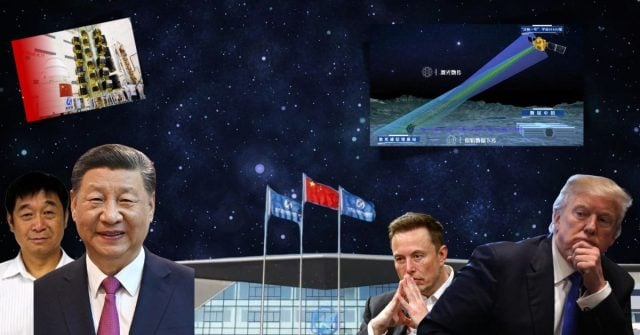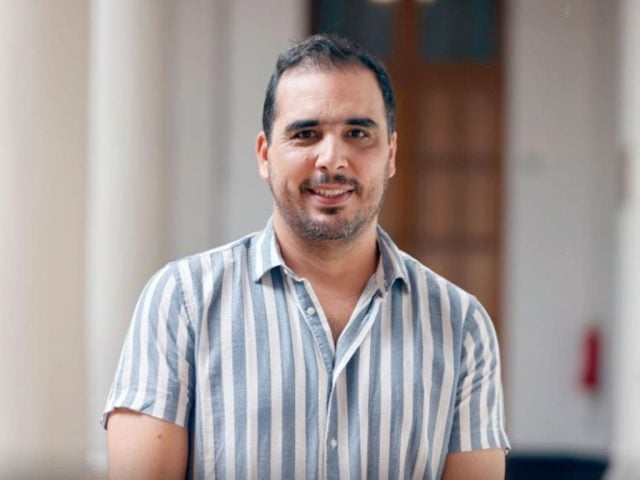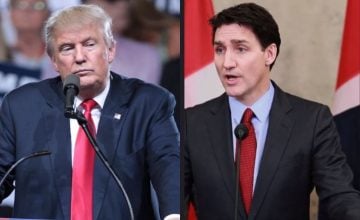The Congress of Peru has governed the country at will in recent years despite the fact that it does not have the sympathy of the population. In a five-year period, it has caused, for various reasons, the early departure of four Presidents of the Republic: Pedro Pablo Kuczynski, Martín Vizcarra, Francisco Sagasti and Pedro Castillo.
This Wednesday, December 7, 2022, is marked as another milestone for anti-democracy in the history of Peru, where a head of State who was elected by historically excluded majorities and who yearned for change in their country, and who tried to govern by just over a year without success due to pressure and persecution from the judiciary and the parliament, was forced to make one last move to seek to unsuccessfully rescue the constitutional order of his country.
Thus, Pedro Castillo, who decided to go after all those who prevented him from governing and take measures to try to unlock the political and institutional crisis in Peru, to reset the State, the justice system, the Constitution and the parliament, went for all or nothing and lost against a monster entrenched in the Peruvian political and State apparatus that has become a bloody legislative ‘dictatorship’ that does and undoes as it pleases in the name of «democracy» and «institutionality».
Although Castillo took the first step and thought of checkmating the parliamentary and judicial mafia that governs Peru, the power within those instances was stronger and it returned the move on to the president so as to leave him, as it had on the agenda, out of the Presidency. and in this way, break with the desire of the Peruvian majorities that had elected the president to change the country.What did Castillo want to do?
Castillo announced on Wednesday morning the dissolution of Congress and the establishment of an emergency government in the South American country. However, less than two hours later, Parliament held its scheduled session and dismissed the president for «moral incapacity».
«In response to the citizen’s claim, throughout the country, we made the decision to establish an emergency government aimed at restoring the rule of law and democracy», said Castillo in a message to the nation.
According to the president, the measure included:
– Temporarily dissolve the Congress of the Republic and establish an «exceptional emergency government».
– Call, as soon as possible, elections for a new Congress with constituent powers to draft a new Constitution within a period of no more than nine months.
– A nationwide curfew is decreed from 10:00 pm to 4:00 am the following day. The measure is effective from this Wednesday.
– The Justice System is declared in reorganization: Judiciary, Public Ministry, National Board of Justice and the Constitutional Court.
Castillo claimed that as of that today and until the new Congress of the Republic was established, his management could govern through «law decrees». He also had declared a curfew.»Congressional dictatorship»
In his message, Castillo accused the majority of congressmen, identified with «racist and social interests in general», of «disastrous obstructionist work».
He added that these «have managed to create chaos in order to assume the Government disregarding the popular will and the constitutional order».
«We have spent more than 16 months of continuous and stubborn campaign of attacks against the presidential institution, a situation never seen before in Peruvian history», he emphasized, noting that the «only agenda of Congress» since July 29, 2021, «has been and is the presidential vacancy, the suspension, the constitutional accusation or the resignation at any cost».
For that majority of congressmen who – he said – represent the interests of the big monopolies and oligopolies, «it is not possible for a peasant to govern the country and do so in preference to satisfying the pressing needs of the most vulnerable population».
Castillo pointed out that from the Executive there were repeated calls to the Legislature to resolve their «disagreements» through dialogue, the majority of the legislators have refused and «they have not stopped in their objective of destroying the presidential institution».
«Congress has destroyed the rule of law, democracy, separation […] Modifying the Constitution with ordinary laws, in order to destroy the Executive and install a congressional dictatorship», he said.
A tough Congress to beat
Castillo, who was trying to anticipate the vacancy motion by Congress, was interpreted by the opposition as a «coup d’état», and it was dismissed by Parliament, largely due to the betrayal of many of his allies in the legislative branch. .
Thus, Parliament, far from assuming its dissolution, carried out the session scheduled for the vacancy motion, but its head, José Williams, decided to go directly to a vote on the resolution without any debate. Although in principle it was believed that the congressmen would not reach the necessary 87 votes, Castillo’s onslaught against the Legislature turned the majority to endorse his dismissal. There were 101 affirmative votes and only 4 negative.
Almost all of Castillo’s executive train and ministers resigned en masse. The head of the Cabinet of Ministers, Betssy Chávez was one of the last to join, alleging that they rejected the measure of the now former president.
Before Congress appointed Vice President Dina Boluarte as the new head of State, Castillo was detained by the National Police at the Prefectural headquarters, where he went in search of guarantees together with the former president of the Council of Ministers, Aníbal Torres.
In this process, the State Attorney General, Daniel Soria, denounced Castillo before the Prosecutor’s Office for the alleged commission of the crimes of sedition, abuse of authority and serious disturbance of public tranquility.
Justice system acted as a block against Castillo
Francisco Morales, president of the Constitutional Court, said that «nobody owes obedience to a usurper government and Mr. Pedro Castillo has carried out an ineffective coup».
According to the Constitutional Court, the president «has placed himself outside the Constitution and the law» and, therefore, Congress must act and the country’s vice president, Dina Boluarte, assume the country’s Presidency.
For her part, the National Prosecutor, Patricia Benavides, rejected the president’s measure, which she described as a «breach of the constitutional order».
The Attorney General’s Office issued a statement stating that Castillo «has flagrantly violated the Constitution». For this reason, the Attorney General, Daniel Soria Luján, announced that he would file a criminal complaint against Castillo before the National Prosecutor.
The president of the Judiciary, Elvia Barrios Alvarado, said that Castillo’s announcement was an «unconstitutional decision» and condemned «all actions that break the constitutional and legal order».New «President» until 2026?
The Congress of Peru finally swore in Dina Boluarte as President of the Republic. Boluarte, who was serving as vice president of the nation, earlier rejected the decision announced in the morning by Castillo to dissolve parliament to establish an emergency government that would restore «the rule of law and democracy» to the country.
«I will defend national sovereignty, the physical and moral integrity of the republic and the independence of democratic institutions», said Boluarte during the oath after receiving the presidential sash from the head of Parliament, José Williams.
She added: «I assume in accordance with the Constitution of Peru, from this moment until July 26, 2026», when the end of Castillo’s term was scheduled.
Minutes later, after her arrival at the Government Palace in Lima, she pointed out that «the most important thing is not to make the same mistakes, but to keep moving forward».»Political Truce»
«There has been a coup attempt. This action, promoted by Mr. Pedro Castillo, has not found an echo in the institutions of democracy or in the street. This Congress of the Republic, in response to the constitutional mandate, has made a decision and it is my duty to act accordingly», said Boluarte.
And she added: «I assume the position of President of the Republic, being aware of the enormous responsibility that falls on me, and my first call is to summon the broadest unity of all Peruvians».
The president appointed by Congress called for a «political truce» to install a government of «national unity» to rescue the country from «corruption and misrule».Support from the Justice system
After Dina Boluarte’s swearing in, the president of the Judiciary, Elvia Barrios, greeted her arrival at the presidency and affirmed that the former vice president «assumes in accordance with the provisions of the Constitution in the face of the attempt to breach the constitutional order by Pedro Castillo».
«From the Judiciary, we guarantee the citizens (of the country), the continuity of the service of the justice system and our commitment to respect the independence and separation of Powers», she wrote on her Twitter account.
Boluarte also received the support and visit of Francisco Morales, president of the Constitutional Court, at the Government Palace. «It is time to work with unity», said the president.
The new President of Peru is a lawyer, born on May 31, 1962 in Chalhuanca, Apurímac. She becomes the first woman to preside over the country. The intervention of Congress is the third to apply a regime of presidential succession during the last 5 years.OAS supports the new Government
The Permanent Council of the Organization of American States held an extraordinary session to address the political crisis in the South American country.
«What happened today in Peru when Pedro Castillo dissolved the Congress of the Republic without a constitutional, legal, or regulatory basis constitutes an alteration of the constitutional order in the country», said OAS Secretary General Luis Almagro.
Almagro approved the appointment of Boluarte and said that he would soon establish communication with the ‘new’ president. «This afternoon I will be seeking communication with her to convey the support of the OAS General Secretariat for democracy, peace and institutionality in Peru, and the urgent need to recompose the democratic path in the country”.
In the extraordinary session, Almagro called for «internal peace» and «calm» so that the «activated institutional mechanisms keep Peru on the path of freedom and coexistence».
For their part, various governments in the region such as Argentina, Brazil, Bolivia, Chile, Colombia, Mexico and the US spoke out to express their concern and ensure the continuity of the democratic order in Peru.Mexico regrets the climate of «hostility» against Castillo
For the president of Mexico, Andrés Manuel López Obrador, the climate of «confrontation and hostility» throughout Castillo’s government is «regrettable», although he made it clear that his country’s policy is one of non-intervention and respect for the internal affairs of countries.
«We consider it unfortunate that because of the interests of the economic and political elites, from the beginning of the legitimate presidency of Pedro Castillo, an environment of confrontation and hostility has been maintained against him until it led him to make decisions that have served his adversaries to consummate his dismissal with the sui generis precept of ‘moral incapacity’. Hopefully, human rights are respected and there is democratic stability for the benefit of the people», said the Mexican president.
For his part, the Foreign Minister of Mexico, Marcelo Ebrard, indicated that his country regretted «the latest events» in Peru and vowed «for respect for democracy and human rights» for the wellbeing of the population.
In an interview with local journalist Denise Maerker, Ebrard said that they were «very concerned» about the situation in Peru and that they were even willing to grant Castillo asylum if he requested it.Brasilia wishes Dina Boluarte «success»
Meanwhile, the Brazilian Foreign Ministry said in a statement that the government of Jair Bolsonaro «follows with concern the internal political situation in Peru» that led to «the constitutional dismissal of President Pedro Castillo by Congress and his succession by Vice President Dina Boluarte».
Brasilia considered that the measures adopted by Castillo are «incompatible with the Peruvian constitutional framework» and «represent a violation of the validity of democracy and the rule of law». For this reason, he hopes that «the constitutional decision of the Peruvian Congress represents the guarantee of the full functioning of the democratic State in Peru».
«The Brazilian government expresses its willingness to continue maintaining the solid relations of friendship and cooperation that unite the two countries and wishes President Dina Boluarte success in her mission as head of the Peruvian State», added the Brazilian Foreign Ministry.
For her part, the president-elect of Brazil, Luiz Inácio Lula da Silva, wished Boluarte success «in her task of reconciling the country and leading it along the path of development and social peace». In a press release, Lula da Silva considered it «unfortunate» that a «democratically elected president has this fate, but I understand that everything was done within the constitutional framework».The final blow to Castillo
Since his inauguration, in July 2021, the now former president Pedro Castillo, a rural teacher and left-wing union leader, has faced three vacancy motions and twenty complaints against him for alleged acts of corruption.
Castillo had denounced constant attempts to destabilize his government by right-wing parliamentary blocs and the press. He had also lost the support of Peru Libre, the party with which he reached the highest political office, from where he was expelled for allegedly implementing a «failed neoliberal program».











